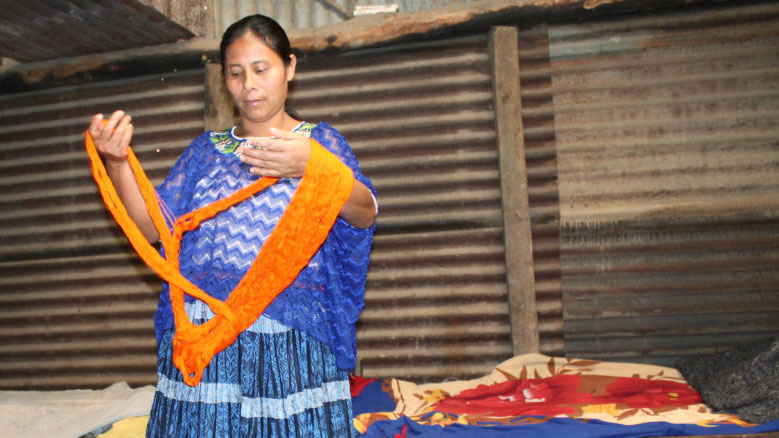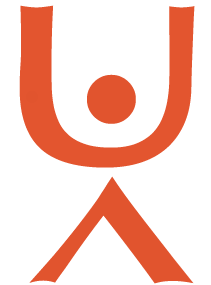Aurora Beb Caal, 38, lives with her husband and seven children, who range in age from 5 to 18. Before starting Trickle Up’s program, Aurora’s household income was not enough to cover their basic needs.
They were unable to buy medicine or clothes, and they were sometimes forced to borrow money from their neighbors to purchase other necessities. To repay these loans, Aurora would weave güipiles (traditional Mayan blouses) and her husband worked as a day laborer until they could collect enough money to repay the loan.
Aurora told us she could usually afford food for everyone in the family, but only in very small quantities. They could only grow enough for four months of food for the family, without any left over to sell for a profit. June through August were the most difficult months, and they would often go hungry. Aurora said that her family has survived some difficult seasons.
The family’s precarious situation was reflected in their home as well. The walls of the house were made of thin metal sheets and they used a nylon cloth to divide the kitchen from a single room with three beds where all nine of them slept.
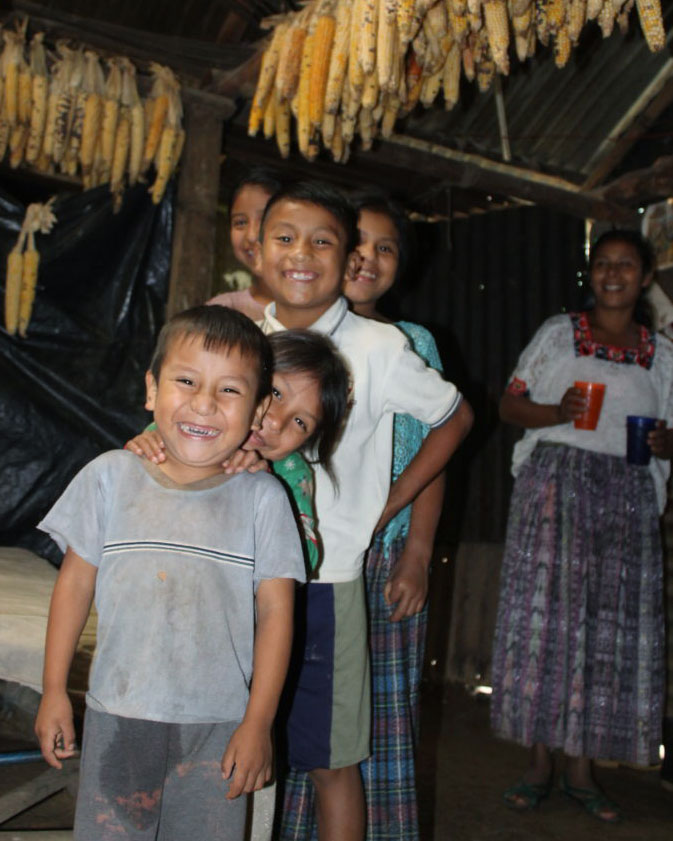
When she was selected as a Trickle Up participant, Aurora said she was looking forward to having more resources to improve her family’s life. She wanted to provide her children with better food and housing, and was concerned about their health. She dreamed that her children would be able to read and write – something that she never had the opportunity to learn.
It’s not always smooth sailing for some participants, which is why continued coaching and training are key to their resilience and success. Aurora’s business plans saw some setbacks in the beginning.
Aurora had planned to use her seed capital to plant cabbage on her father’s land, but her father instead chose to plant corn. She then thought about opening a store, but since they live far from a road, she and her husband decided it wouldn’t get enough business. Then, her husband suddenly decided to migrate for work, so Aurora had to prioritize the daily needs of her children and put her business plans on hold.
In the meantime, she found a way to support her family without having to leave her younger children alone at home. She used her $132 (Q1000) seed capital and $35 (Q265) of her own money to buy thread to weave and sell güipiles with the help of two of her daughters. Just three months later, her working capital was $199 (Q1510). “Now, I have my own money to buy my threads and weave,” she says.
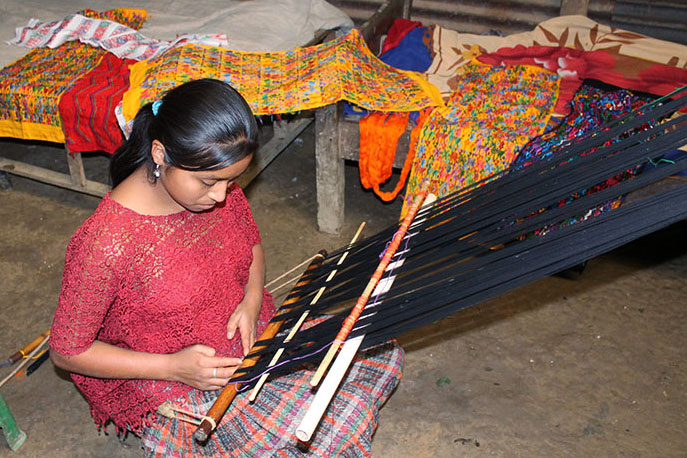
Aurora learned about different business ideas from the trainings that are part of Trickle Up’s program. She also learned how to run a savings group, including setting rules together and imposing fines when members don’t respect them. She likes to save now, especially because her money generates interest through her savings group. She said, “It is good to share the efforts among all when we distribute the accrued interest.”
Before the program, Aurora’s family didn’t have any savings; her husband earned only $4 (Q30) a day. They couldn’t afford basic needs for their family of nine, let alone have anything left over to save for the future. Just five months after starting to save, she already had $28 (Q210) and took out a $13 (Q100) loan from the savings group to buy food.
Aurora remembers being suspicious of the program at the beginning, since the selection of participants coincided with Guatemala’s election season. She worried the program might have some partisan political connection, or her participation might cause conflict with other members of the community.
But she soon realized that the program had no political agenda or affiliation, as people from different parties were all part of her savings group. She is proud of her understanding of the program, despite not being able to read or write. She explained, “It’s good that they speak to me in my language, Poqomchi’, so I can express myself and understand what they tell me.”
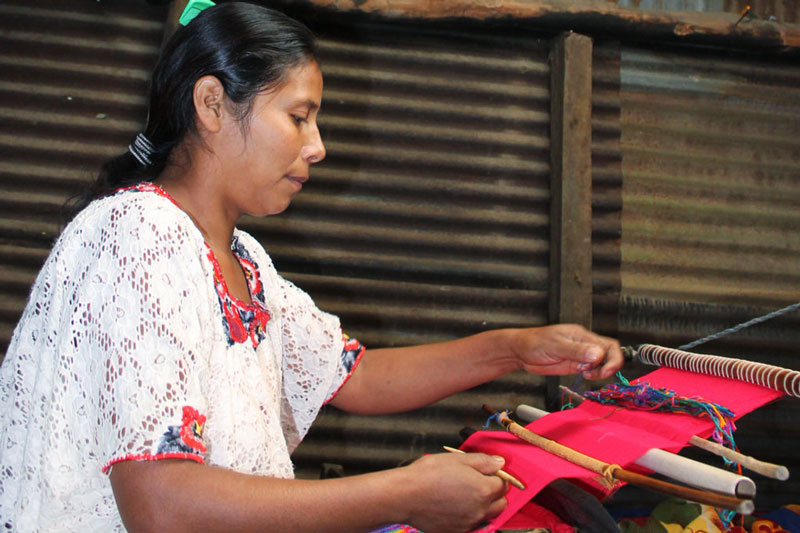
“I am changing my attitude, teaching new things to my children, and doing things I didn’t do before. My daughters have learned to knit. I also explained to my husband about the savings group. I look forward to the end of the cycle when I receive more than I saved,” she tells us. She is proud that her children are seeing their mom working and managing her own money. She says, “My children have noticed that now I can make several güipiles to sell in the time I used to make just one.”
Since the beginning of the project, Aurora says her life has changed. She is now saving, has her own money to buy thread and make güipiles with her daughters, and she has diversified the food her family eats.
She also owns chickens, grows corn and beans, and can even buy firewood in bulk, which is cheaper than the wood she was buying before. During the recent hungry season, Aurora had enough money to buy corn and her family didn’t have to go hungry.
Today Aurora has 20 chickens, compared to just one at the beginning of the program. She also planted beans, but unfortunately, part of the harvest was stolen. She learned that in the future, she should harvest her crops earlier to avoid theft. She finished the year with $122 (Q925) in working capital. Aurora’s hens also just had chicks, which will increase the value of her working capital over the coming months.
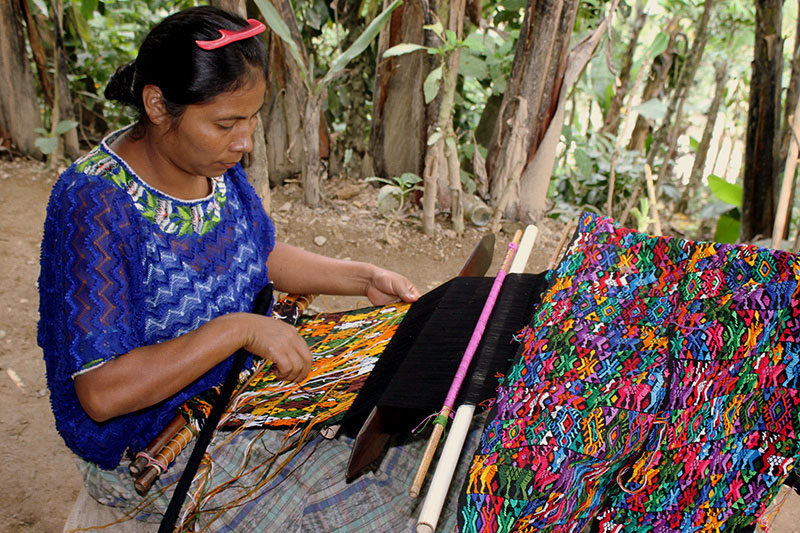
At the end of the first year in her savings group, Rio Jolomche, Aurora received $92 (Q702) from her shares, which she invested in seeds and other equipment for her bean crop. She also bought clothes for her daughter. Just two months after the start of the second cycle, she already has $20 (Q150) in savings. She’s not sure what she’ll do with these savings yet, but she might buy metal sheets for the roof of her home.
She’s excited to continue her savings and businesses even after the end of the program. She hopes her children will have more opportunities than she did at their age. She told us, “I want to have my business so I can send my children to school.” Today she feels she is better able to use and manage resources to both save for the future and cover her family’s expenses.

